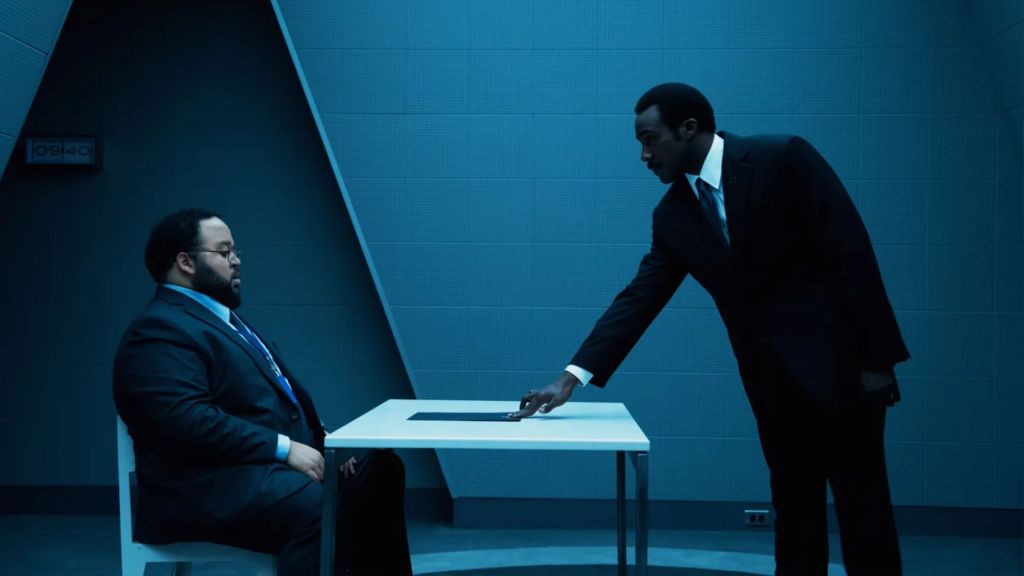Thanks to the never-ending hustle culture vibes, people these days are always talking about work/life balance. It’s an essential part of our health, and yet it often feels unrealistically out of reach. Perhaps that is why so many shows have begun playing with this concept. Black Mirror, Mr. Robot, The Office, and Better Off Ted all touched upon this subject. However, one show took this increasingly common premise and merged it with a corporate dystopian horror, creating something that is absolutely bone-chilling. Severance is described as a science fiction psychological thriller, but there’s something much more human – and corporate – about the messages woven into this narrative.
Videos by ComicBook.com
Severance is one of several new shows on Apple TV+, with two seasons under its belt (so far). The series follows a group of employees working for a major corporation, but there’s a catch. To land their roles at this company, each person had to agree to be severed. Translation: they had to allow the company to implant a chip directly into their brains, splitting their working selves from their outside selves. The “Innies” and the “Outies.” The show stars Adam Scott (Mark S.), Zach Cherry (Dylan G.), Britt Lower (Helly R.), John Turturro (Irving B.), and Tramell Tillman (Seth Michick).
Corporate Dystopians and Totalitarian Control

Severance is the epitome of a corporate dystopia, as Lumon Industries consumes and controls. The severing procedure is just one example of how far Lumon will go to protect its own interests, but everyone knows that this barely scratches the surface. If Lumon is willing to openly disclose something as invasive as severing, many worse things are hiding behind locked doors.
Throughout two seasons, Severance begins to open the viewer’s eyes, showcasing a corporate structure that goes much deeper than one could have ever feared. On the surface, Lumon is a power-hungry company willing to take extreme measures. Dig a layer down, and the totalitarian elements become apparent, as the Innies suffer constant monitoring, extreme manipulation (gaslighting at its finest, or worst), and pervasive signs of corporate paternalism.
Unfortunately, Lumon is like an onion, meaning there are even more layers for us to work through. Lumon promotes a workforce that puts loyalty over truth. This can be seen shining through in management. Management may hold power over the Innies, but their power only lasts so long as they remain unceasingly loyal to the company. To prove this loyalty, they have to lie and gaslight; to the world, the Innies, and even to themselves.
Next is an alarmingly ritualistic side of the company. The life and words of Kier Eagan have become mythological in nature, carrying religious weight. This has evolved over generations, letting people establish rituals that are more in keeping with cults. Once these behaviors come out into the open, viewers quickly start noticing these hints everywhere. Though realistically, not all hints are subtle, including the goat room.
[RELATED: Severance: Every Department on Lumon’s Severed Floor (And What They Do)]
Letting Corporations Define Identity

The concept of severing is disturbing, and not just to the audience. Characters within the series have open discourse about its ethics, though those more outspoken are written off as quacks (early in the series, at any rate). Ultimately, there is something deeply concerning about handing over the keys to one’s deepest self. By allowing Lumon to sever human beings, society is effectively allowing a corporation to define the identity of the self.
In the show, severance advocates claim that the procedure allows people to recapture that treasured work/life balance. But this is just another corporate lie. Just because one doesn’t remember working eight hours doesn’t mean they didn’t have to work. Worse, they have to trust that their company didn’t abuse them (mentally, physically, or emotionally) during the time they can no longer remember. Putting that much faith in any corporation, day in and day out, is a dangerous precedence to set.
Even if this argument of a healthier work/life balance was valid (which it isn’t), there’s still another resounding problem: to gain this balance, a person would have to effectively agree to enslave part of themselves. Think about it. The Innie is only allowed to quit when the Outie approves of it. Likewise, they never see any of the benefits of their labor (pay, days off, and countless other luxuries people take for granted).
[RELATED: You Can Actually Download Severance’s Self-Help Book in Real Life]
Corporate Dystopian Meets Cosmic Horror

At the end of the day, Severance is so much more than a psychological thriller. It’s a cosmic horror tale wrapped in an artificially lit corporate setting. The severance procedure literally makes employees strangers, not just to the outside world, but to themselves. That element should be ringing alarm bells to all cosmic horror fans, as isolation and the insignificance of humanity are core and common elements of the genre. Severance doubles down on these themes, weaving in blurred realities, psychological disorientation, and indifferent entities (Lumon Industries).
Severance is available to stream on Apple TV+.









